|
 The
VigilanceVoice
The
VigilanceVoice
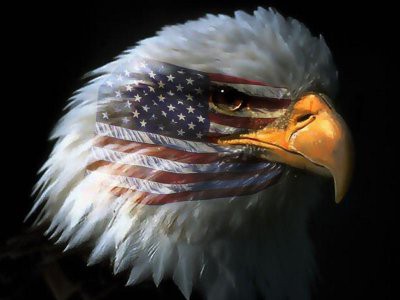
VigilanceVoice.com
Saturday--July
27, 2002—Ground Zero Plus
318
The Monkey Business Of Vigilance
Is Not Eating Them--The Monkeys!
by
Cliff McKenzie
Editor, New York City Combat Correspondent News
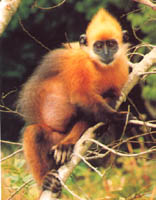
GROUND ZERO, New York
City, July 27--Ever have a bunch of monkeys save your life? I have.
Ever eat a monkey? I hope not.
My eyes were drawn to a
story in the New York Times this morning about the ill fate of rare
monkeys in Vietnam. Hunters are killing off some of the most beautiful
and gracious of our ancestors and eating them in elegant restaurants as
delicacies. In a way, they are eating our great, great, great, great,
great grandchildren, grand nieces, grand nephews.
I don't think there is a child alive who isn't awed by the antics
of a monkey. The biggest sour puss child who seems immune to laughter
breaks into a wide grin as monkeys cock their heads and scratch at their
armpits, hang upside down by their tails, or leap from branch to branch,
chattering and screeching in playful joy and respite. And nothing is
more fascinating than to have a monkey stare at you, its curious eyes
flicking all over your face, its leathery hands touching your nose and
mouth, exploring your countenance as though trying to remember exactly who
you are, and why you look so "funny."
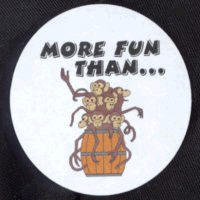 |
But the fate of monkeys in
Vietnam seems foreboding. The lush, jungle nation of nearly 80 million
people has a taste for monkey meat as well as monkey blood. During the
Vietnam War, I walked through the narrow, clogged streets of Saigon and
Cho Lon and saw countless monkeys trapped in cages. You could order the
one you wanted. The merchants drained its blood and you drank it warm,
an alleged delicacy I never did or want to try.
Monkeys have always been my friends. Prior to joining the U.S.
Marine Corps, I was a senior in psychology at the University of Oregon in
Eugene. I was specializing in learning behavior, and spent a
considerable amount of time working in the University's primate lab. At
the time, we enjoyed the largest collection of wild monkeys west of the
Mississippi. The top billing for primate research at the time belonged
to Yerkes, a world renowned primate testing center.
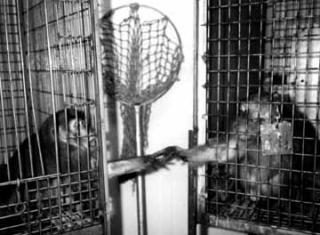
|
I conducted various
learning tests on a variety of species, all wild monkeys, the best for
research. We used a Wisconsin General Testing Apparatus, measuring the
discrimination skills of the animals. After getting my "test monkey"
from the primate lab, I pushed a tray toward the monkey in the testing
room with various shapes or letters on it. The money had to figure out
which one had a raisin under it.
I loved the lab and monkeys and spent as much time with them as I
could. I talked to the simians, getting to know them probably better than
I knew most humans. They were rare, ranging from Madagascar ring-tailed
lemurs to squealing spider monkeys that ignited the housing room with a
shrill cacophony whenever you entered.
When I arrived in Vietnam, I felt welcomed by them in this the full
of their brothers and sisters. On patrols deep in the jungles, the
sounds of the monkeys was a "safe sound." It meant everything was Okay.
But when the monkeys fell silent, and the jungle seemed to suck in a deep
hesitant breath, you knew danger lurked--that an ambush or the enemy was
close by.
On one patrol we were moving through the dense underbrush. I was
listening to the sounds of the jungle, keying in on the monkeys with whom
I had continued a close relationship. Suddenly, there was silence,
following a burst of their raucous chattering, sending out a warning.
I halted our patrol and motioned for the men to spread out and take
cover. Ahead of us was a long column of Viet Cong bringing in
supplies. Had we kept moving we would have stumbled into the thick of
them. Because of the monkeys' alarm we instead set up an ambush and were
successful in our mission.
On other patrols, I had various encounters with monkeys. Our
ambush unit switched back and forth, half on alert, half sleeping, at
two-hour intervals. I'm a snorer, so I always dug a hole in the earth and
put my cover (soft hat) down in the cup of earth I dug with my bayonet and
buried my face in it while I slept, so that if I snored, the ground would
absorb the noise and my snoring would not alert any enemy patrols (and
irritate my fellow marines).
 |
One night I awoke startled.
Crouching in front of my face, just a few inches from me, was one of my
simian friends. It quizzically stared at me, its long, leathery fingers
clutching the bill of my soft cover. My heart raced as I reached for my
weapon, not yet sure in the haze of awakening what the figure was. Then
the monkey peeled back its lips, almost as if smiling, and jerked my cover
away. He stood for a second staring at me like some errant, playful child
who was "stealing" my toy, and then scampered off into the moonlight
night, swallowed by the leafy green of the Vietnam jungle.
I wanted to laugh, but constrained myself. In
the madness of war, I was befriended in an odd way by a creature, who
perhaps knew I was a "monkey man," a term often used in psychology to
identify those who tested monkeys versus those who tested rats. We called
rat testers--"rat people"--a lower form of research, we affirmed.
These experiences, three decades old, streamed back to me as I read
the Times article about the endangered primates.
I was revolted as I continued to read. I couldn't imagine people
eating the delicate, beautiful creatures whose biggest joy in life, at
least in my mind, is making people laugh at their antics.
 |
The more I read the more I realized I owed
the monkeys. They had helped save my life and the lives of my buddies from
an enemy ambush. More than once I had used their silence as a warning
during more than 100 patrols and missions I participated in. They
became my Sentinels of Vigilance, alerting me to danger, keeping me
appraised of the fine line between life and death.
The idea that rich Asians were coming to Vietnam to feast on the
exotic meat stripped from rare simian bones, upset me. It made me think
of cannibalism rather than a gourmand ritual.
 |
|
Cat Ba langur |
One of the
most beautiful and rare monkeys considered the "feast for a king" is the
Cat Ba langur. It is heavily hunted, and, according to NY Times
travel writer Connie Rogers, who just visited the country, is a top menu
choice for over 100,000 Asians who visit Cat Ba island each year.
 |
|
Grey-shanked
Douc langur |
Two of the rarest monkeys, the Cat Ba langur and
Delacour, are projected to become extinct in the next few decades, reports
the American Museum of Natural History. One-fifth of the world's 25 most
endangered primates live in Vietnam.
The country is rich with vanishing primates--rare Eastern
Black-crested gibbons, douc langurs, Ha Tinh langurs and Tonkin snub-nosed
monkeys.
A battle is being waged to preserve them. Conservationists have
established rescue missions to save the dwindling simians from the cooking
pot and from trappers who seek to capture and sell them as pets. Both
acts are illegal, but policing the dense jungle is more than a challenge
for a government with its hands full in rebuilding its nation.
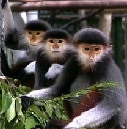 |
In a world filled with
Terrorism of all degrees, one might think a monkey's fate is low on the
totem pole. But perhaps not. Perhaps saving a monkey's life is more
important than finding Osama bin Laden and taking his. At least, that is,
to a child.
I've always looked at monkeys as children of laughter. They
force a child to smile. The thought of someone eating them put a knot in
my gut. It made me wonder how to apply Vigilance to the Terrorism of
monkeys.
Vigilance is an inclusive rather than exclusive venture. When one
thinks of combating Terrorism, the first thought is bolting the door to
defend against masked strangers tossing satchel charges at door steps.
But Vigilance is more than being defensive, it's an offensive attitude.
Often, it comes to focus stronger when emotionally charged than when
physically threatened.
The benchmark question of Vigilance is: "What's good for the
children's children's children?"
Certainly, eating monkeys, especially rare, beautiful ones, doesn't
hit the top of the charts. By nature, I'm not an animal rights activist.
I'm not a garbage can banger who walks down the street claiming the sky is
falling if we don't save the spotted owl. But I do set aside my
garrulous nature to stop and think about the kids--not only the human
kids, but the children of the monkeys as well. After all, their great
great grandparents helped save my life.
 |
I also can't help but feel some close
natural connection, some ancestral link considered by many evolutionists
to be the dividing line between us humans, who can choose the right or
wrong thing, and our tree-swinging buddies who operate solely from
instinct.
I also understand mankind’s need to expand. In Vietnam, as with any
nation that progresses, the forests are being farmed for trees to build
the country and supply natural resources. A monkey has little Voice in
its own defense--either from ecological intrusion or from hunters who want
their meat to sate the pallets of their customers.
But I can’t turn my head to the issue of Vietnamese monkey
plight.
.jpg) |
Terrorism is about Complacency--the lack of concern. Complacency
is fed by Fear and Intimidation. One of our great Fears is impotency on a
major issue—that lack of ability to “make a difference.” Intimidation is
the other ingredient: "What can I do about the problem with monkeys being
eaten in Vietnam when America can't even find Osama bin Laden?"
Complacency thrives in a state of immobilization, a state of
resignation. It grows in a myopic view that makes it hard to see how our
“little Voice” can do anything, as well as by the stunted nature of our
vision.
Vigilance, on the other hand, gives us a much longer, richer,
deeper view to the horizon and beyond.
If we think about monkeys as our far-distant children, how many of
us would stand for others eating them? If someone told you your child
was wanted on the menu for people who like the taste of "little things,"
how would you react?
It's one thing for a creature to be taken to become a pet, or part
of a zoo, but quite another for it to be served as a main course, ending
its life, and its ability to procreate. It seems to me that one of the
saddest acts of Terrorism in our world today is eating "rare monkeys."
It would be easy to neglect this small issue in light of larger,
far more pressing ones that agitate the world.
But Vigilance is about vision. It's about seeing far into the
future, to the children's children's children's children benefit..
While we might think we can't do a damn thing about the eating of monkeys
in Vietnam, that may not be true at all. And, doing something about it
may be far more important to our children than rolling bin Laden’s head
down Main Street, or prosecuting the financial “monkey eaters” at Enron
and Arthur Anderson, or turning Martha Stewart into our our lady with a
scarlet letter on her forehead.
Lack of “monkey vision” might deprive our children of a precious
association with a distant cousin, might reduce the awe in their eyes when
they see one in a zoo, or on Discovery Channel.
|
There are things you should consider
While you are at the zoo,
For as you watch the monkey,
The monkey's watching you.
At dinner when you tell your mom,
"The monkey's a disgrace."
The monkey talks about the kid
With mustard on his face. |
|
from
Zoo News "Do's and Don'ts" |
Vigilance demands we make a
stand, that we draw a line in the sand and add some mortar or concrete to
it. In the long run, we don’t want our children to think we sat back and
did nothing as the monkeys of the most rare and precious genre were
consumed by tourists who flocked to Vietnam to eat the last remaining
species of our children’s most distant relatives.
Complacency tells us to turn our head, to leave the rescue of the
monkeys to someone else, someone better equipped—to the “do-gooders.”
But Vigilance demands that we toss Complacency overboard, and that we make
some effort, however small, as a sign to our children that one can take a
stand—that one grain of sand can ultimately become a beach.
. Maybe it's just sending some important greenbacks to one of the
rescue camps in Vietnam that attempt to protect the rare monkeys. Or,
perhaps it's rallying the kids in the neighborhood to write letters to the
head of Vietnam, or to our U.S. Trade Division that offers money and
outlets for Vietnamese commerce.
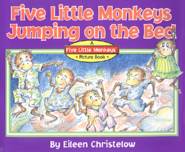 |
Maybe it's a simple
as talking the “monkey issue” over with your kids, and letting them know
you care about their feelings, asking them what they think they can do,
what the family can do, to help out the at-risk monkeys. A favorite
children's song would be changed to No More Monkeys Jumping on the Bed
(see book on right).
Vigilance is a lot about listening and learning what’s in your child’s or
loved one’s heart.
Vigilance takes Courage, Conviction and Right Action to be set
into motion. A child who sees his or her parents, grandparents, uncle,
aunt, or loved one concerned about a monkey's future, takes a second look
at his or her role in the world. He or she sees people who are
concerned—not afraid to be a “grain on a beach.” The Vigilance
expressed over a monkey’s future can have the “butterfly effect.” The
effect is said to start with the ripple of a butterfly’s wings upon the
water, very slightly moving it, but as it builds and grows, it can result
in a giant wave culminating on some beach thousands of miles from it
origin.
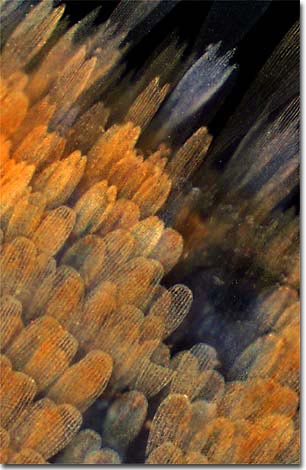 |
|
Rippling Butterfly Wing |
I owe the monkeys maybe my life, so I have an extra
obligation. But I also have grandchildren who need to learn how to be
more Vigilant than Terrorized by life. They need to know their Voices,
however small and seemingly insignificant, have a right to be heard.
They need to know they can stand for something even though others may not
stand with them for whatever reason. And, I, as a Parent of Vigilance, a
Grandparent of Vigilance, a Citizen of Vigilance, owe it to them to show
my concern for the monkeys.
Below, I've listed some websites you can browse. (Note:
They have great pictures of the monkeys on them)
To sum up my Vigilant point, I ask--"Would you eat a rare,
endangered species monkey just because it tasted good?" If not, maybe you'd like to show your children the power of one
Vigilant Voice--yours.
Vietnamese Embassy--www.vietnamembassy-usa.org
Endangered Primate Rescue Center--
www.primatecenter.org
Cuc Phong National Park--http://nytts.org/vietnam/
NY Times Article--http://www.nytimes.com/2002/07/28/travel/VIETECO.html
Go To July 26--Vigilance Not Vigilantes
©2001
- 2004, VigilanceVoice.com, All rights reserved - a ((HYYPE))
design
|
|










.jpg)



